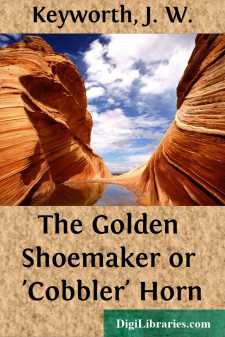Categories
- Antiques & Collectibles 13
- Architecture 36
- Art 48
- Bibles 22
- Biography & Autobiography 813
- Body, Mind & Spirit 142
- Business & Economics 28
- Children's Books 15
- Children's Fiction 12
- Computers 4
- Cooking 94
- Crafts & Hobbies 4
- Drama 346
- Education 46
- Family & Relationships 57
- Fiction 11828
- Games 19
- Gardening 17
- Health & Fitness 34
- History 1377
- House & Home 1
- Humor 147
- Juvenile Fiction 1873
- Juvenile Nonfiction 202
- Language Arts & Disciplines 88
- Law 16
- Literary Collections 686
- Literary Criticism 179
- Mathematics 13
- Medical 41
- Music 40
- Nature 179
- Non-Classifiable 1768
- Performing Arts 7
- Periodicals 1453
- Philosophy 64
- Photography 2
- Poetry 896
- Political Science 203
- Psychology 42
- Reference 154
- Religion 513
- Science 126
- Self-Help 84
- Social Science 81
- Sports & Recreation 34
- Study Aids 3
- Technology & Engineering 59
- Transportation 23
- Travel 463
- True Crime 29
The Golden Shoemaker or 'Cobbler' Horn
by: J. W. Keyworth
Description:
Excerpt
CHAPTER I.
In a small house, in a back street, in the large manufacturing town of Cottonborough, the young wife of “Cobbler” Horn lay dying. It was the dusk of a wild evening in early winter; and the cruel cough, which could be heard every now and then, in the lulls of the wind, from the room upstairs, gave deepening emphasis to the sad fact that the youthful wife and mother—for such also she was—had fallen a victim to that fell disease which sweeps away so much of the fair young life of our land.
“Cobbler” Horn himself was engaged just now in the duties of his calling, in the little workshop behind the kitchen. The house was very small. The kitchen and workshop were the only rooms downstairs, and above them were three small chambers. The one in which the dying woman lay was over the workshop, and the sound of her coughing came down with sharp distinctness through the boarded floor, which was the only ceiling of the lower room.
“Cobbler” Horn knew that the death of his wife was probably a question of a few hours at most. But he had promised that the boots on which he was at work should be finished that night; and he had conscientiously withdrawn from his wife’s bedside that he might keep his word.
“Cobbler” Horn was a man of thirty or so. He was tall, and had somewhat rugged features and clear steadfast eyes. He had crisp black hair, and a shaven face. His complexion was dark, and his bare arms were almost as brown as his leathern apron. His firmly set lips and corrugated brow, as he bent now over his work, declared him to possess unusual power of will. Indeed a strength of purpose such as belongs to few was required to hold him to his present task. Meanwhile his chief misgiving was lest the noise he was compelled to make should distress his dying wife; and it was touching to see how he strove to modify, to the utmost degree which was consistent with efficient workmanship, the tapping of the hammer on the soles of the boots in hand.
Sorrowing without bitterness, “Cobbler” Horn had no rebellious thoughts. He did not think himself ill-used, or ask petulantly what he had done that such trouble should come to him. His case was very sad. Five years ago he had married a beautiful young Christian girl. Twelve months later she had borne their little dark-eyed daughter Marian. Two years thereafter a baby boy had come and gone in a day; and, from that time, the mother had drooped and faded, day by day, until, at length, the end was close at hand. But “Cobbler” Horn was a Christian, and did not repine.
His task was finished at last, and, with a sigh of relief, he rose to his feet. In that moment, he became aware of a tiny figure, standing in the open doorway of the kitchen. It was that of a little four-year-old girl, clad in a ruby-coloured dress, which matched to perfection her dark skin and black hair. Her crimson cheeks were dashed with tears, and she looked like a damask rose just sprinkled by a shower of rain. The light in her dark eyes, which glistened with intense excitement beneath her jet-black hair, indicated that her tears were those of indignation rather than grief....


